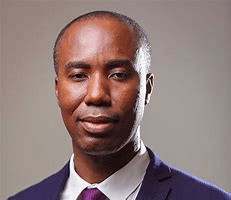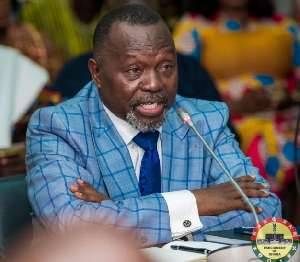NPP Communicator Dennis Miracles Aboagye has warned that media trial and unnecessary politicization are fast becoming a corrosive force in Ghana’s justice system—shaping public opinion and damaging reputations long before any courtroom proceedings begin.
He argued that this trend blurs the line between law and politics, and if left unchecked, it could undermine the very foundations of democratic fairness and due process.
Speaking candidly, Aboagye decried what he sees as a dangerous habit of sentencing individuals in the court of public opinion, even before legal proceedings begin.
“Our country is run with laws, and our laws clearly presume everyone is not guilty until proven guilty. The reputational harm, public and media trial can cause to an individual usually remains unrepaired till death. And nobody should be put through that kind of ordeal, no matter the crime you are accused of.”
Dennis Miracles Aboagye
At the center of this latest concern is the case involving Kwabena Adu Boahene, the former Director General of the National Signals Bureau (NSB).
As the nation awaits formal court action on allegations leveled against him, Aboagye is warning against the ongoing public commentary, especially by key figures like the Attorney General.

According to him, such remarks risk contaminating the judicial process and undermining due process.
He believes that no matter the charges, no citizen deserves to be publicly stripped of dignity before getting a fair chance to defend themselves in court. In his view, this goes beyond partisan lines—it’s a matter of protecting the soul of the justice system.
Public Trial Undermines Legal Fairness
This goes beyond the reputation of a single individual. Aboagye’s concerns highlight a deeper unease about the growing influence of politicians and the media in shaping public perceptions of justice.
Accordingly, he warned that media trial doesn’t just destroy reputations—it creates a dangerous standard that could eventually backfire on anyone, no matter how powerful.
At the same time, Dennis Aboagye urged Mr. Kwabena Adu Boahene to refrain from further public commentary and concentrate on defending himself in the proper forum—the courtroom.

“He deserves to be treated with all the dignity that any of us would desire in this situation. As of now, he is as innocent as the pope, and the AG has a responsibility to prove all the allegations against him.”
Dennis Miracles Aboagye
His remarks challenge both media practitioners and government officials to think critically about the consequences of their words, especially when they concern ongoing investigations.
For Aboagye, this reflects the very foundation of natural justice—a principle rooted in fairness, impartiality, and the recognition of every individual’s dignity.
He urged Ghanaians from all backgrounds to stand up for this standard, emphasizing that “all we are asking for is a trial with dignity, fairness, and open-mindedness.”
Those who reject these values, he warned, should reflect on how quickly the tables could turn: “It could be you in the blink of an eye.”
It’s a powerful cautionary note—a reminder that what feels distant today can become deeply personal tomorrow.
As such, he underscored that true justice must be anchored in principle, not shaped by political convenience.
Media Trial Erodes Trust
Dennis Aboagye also shed light on a deeper structural concern—the erosion of trust in Ghana’s institutions.
He pointed out that when legal matters are played out in the media long before they reach the courtroom, it undermines confidence in the judicial system.
Such premature public trials, he suggested, create the impression that verdicts are shaped more by headlines than by legal evidence—a perception that chips away at the very foundation of justice.

“When the system is fixed, it’s fixed for all of us. If it remains shady, you may be a beneficiary today and a victim the next morning.”
Dennis Miracles Aboagye
In a country where political affiliations often color perceptions of guilt or innocence, Aboagye’s warning is both timely and necessary.
The rule of law cannot coexist with the rule of hashtags, headlines, and talk shows. There must be a return to foundational legal principles—chief among them the presumption of innocence and the right to a fair trial.
The unfolding Adu Boahene case stands as a litmus test for the credibility of Ghana’s justice system.
If media narratives continue to drown out the formal judicial process, the fallout could extend far beyond personal reputations—posing a serious threat to the foundational principles of Ghanaian democracy itself.







